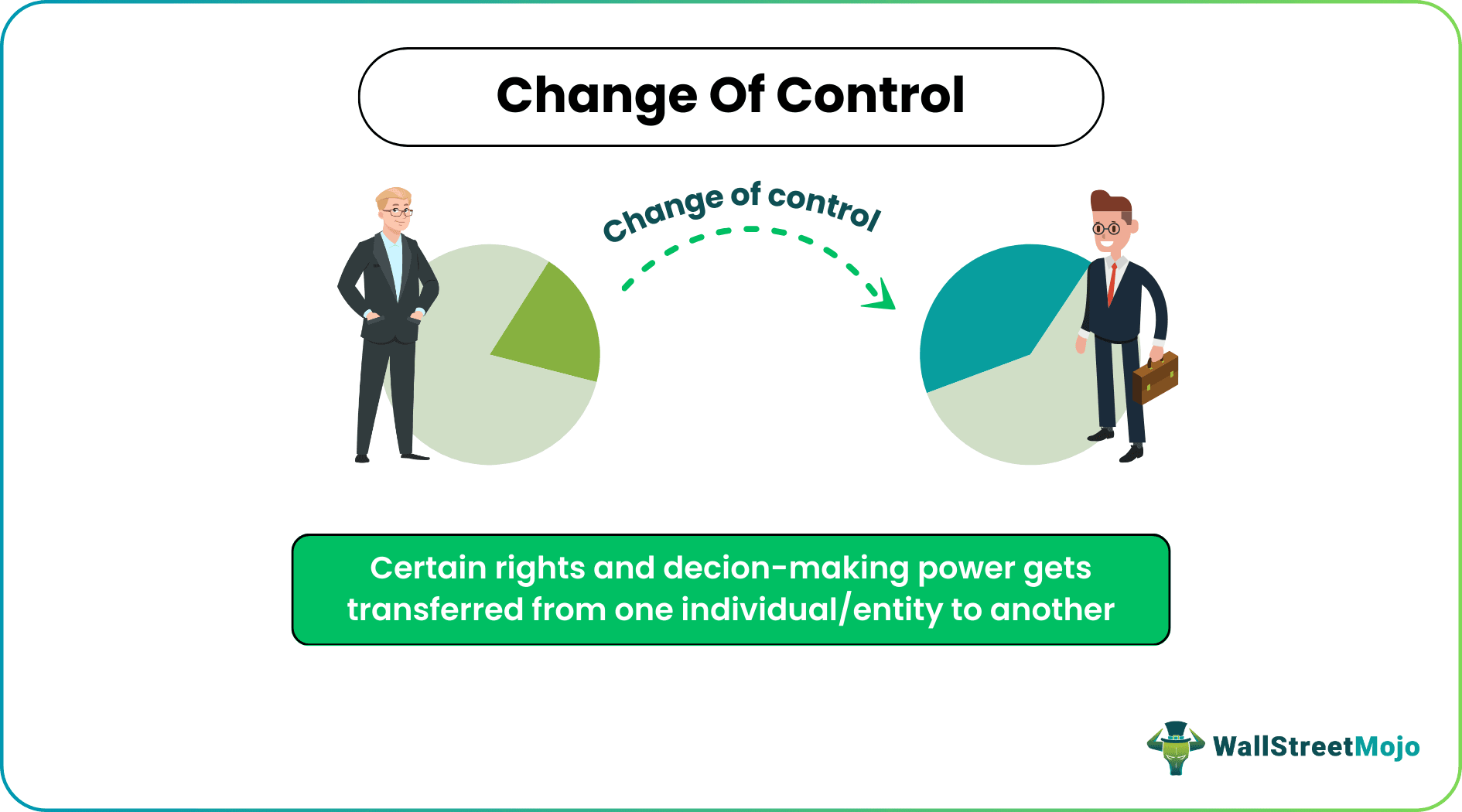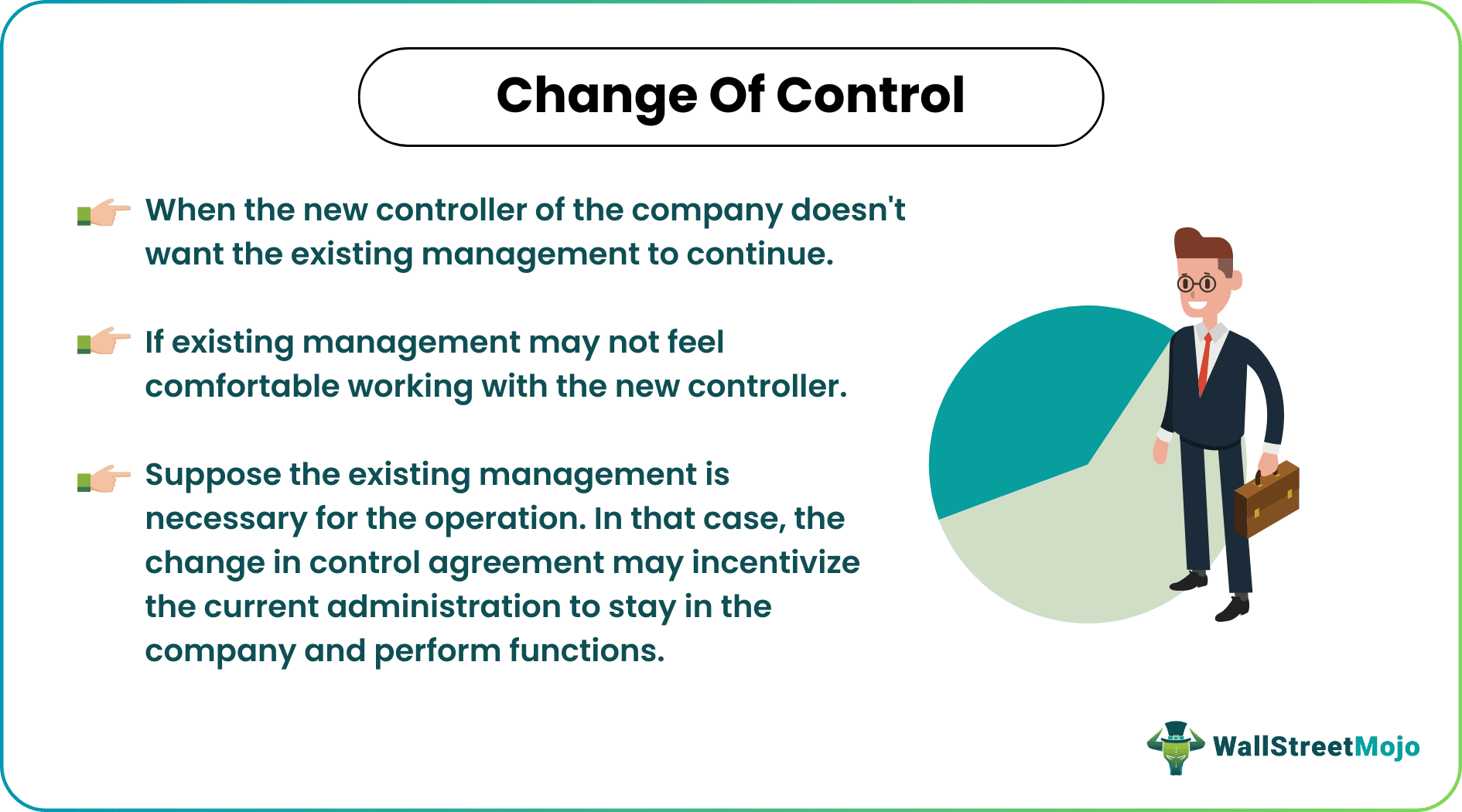Table Of Contents
Change of Control Definition
Change of control refers to a scenario when the company’s majority ownership and business decision-making powers move from one person or entity to another. It is quite common in corporarte sector where the rights are sold to potential buyers at a reasonable price.

The change of control happens when an individual or entity currently in power decides to retire and wishes to transfer certain rights to another individual or entity willing to take up the responsibility. The rights transferred are mostly related to consent, termination, payment, etc.
Table of contents
- Change of Control Definition
- A change of control occurs when the majority shareholder and the authority to make corporate decisions are transferred. These powers are offered to customers at a fair price.
- An agreement that specifies the current administration's right to compensation in the event of a "change of control" during its term is known as a change of control payment agreement. So, during that time, the administration receives a flat sum.
- Cash, shares, or stock options are all acceptable forms of payment. It enables management to work arduously without worrying that they will leave the situation empty-handed.
- The shift of control is customary everywhere. Companies have benefited from a change in control; it has been seen. The new controller has a big-picture outlook and wants to advance. That is beneficial.
Change of Control Explained
Change of control, as the name suggests, involves the transfer of power to let the other authority control the business sphere or other initiatives. It occurs when the one currently in charge is ready to leave the responsibility and hand it over to someone else. Two things that hold significance in the process are the wish of the current authority to retire and the willingness of the potential party to take charge.
In the corporate sector, when venture capital investors invest in companies that are at the initial stage, they provide funding and impose control over the management.

As the company grows and the product begins to gain popularity in the market, the venture capitalists decide to sell its stake to a private equity firm. This is how the change of control works.
The private equity firm provides capital to grow the company further. When the company reaches a steady state, the private equity firm will either sell it to another private equity or make it public.
This transfer of control occurs per the change of control agreement that is prepared, mutually agreed upon by the parties involved, and signed by them. Change of control is common throughout the world with companies enjoying multiple benefits from it. If the new controller is visionary and plans to move forward, no other process could be as effective as this one to take the business to new heights.
Clauses Involved
This clause gives certain rights to a party (such as consent, payment, or termination) if there is a change in ownership or control of an organization. It is a provision in the agreement of change in control. Not all of this control will trigger this provision. For example, there could be specific criteria for the change in management if another company acquires more than 50% stake in a company, maybe sell off most of the company’s assets to a third party, or maximum board members change.
When triggered, the existing management can ask for payment or quit the organization.
When triggered, the existing management can ask for payment or quit the organization.
Provisions
There are challenges that the process face, which might affect its effectiveness. The change of control provisions lets businesses overcome those and help make the process effective and efficient after the other individual or entity takes charge. Some of the agreements or proposals that help make the process effective include:
- Golden Parachute is the first instance. It mostly happens that the company's new controller does not want the existing management to continue. So, the golden parachute is an agreement to give top executives a hefty bonus for their termination from the company. These bonuses help top executives plan their early retirement or fund future endeavors.
- At times, the existing management may not feel comfortable working with the new controller, so they may want to quit. On the other hand, suppose the current administration is necessary for the operation. In that case, the change in the control agreement may incentivize the existing regime to stay in the company and perform functions. So, this agreement helps to motivate the current management to continue with their daily operations without getting demotivated.
- A change of Control Payment Agreement entitles the existing regime to receive a payment if any change of control occurs during the administration's tenure. So, the administration will receive a lump sum during his tenure. The compensation can be in cash, shares, or stock options. It helps management work wholeheartedly without the fear of empty-handedness in such a case.
Example
In 2008, Emami acquired a controlling stake in Zandu from Vaidyas at approximately $84 per share. The bidding went on for several months and is considered the biggest hostile takeover in India. In the end, approximately $91.2 million was the consideration paid by Emami for a 72% stake in the company. So, a change of control occurred, and Emami controlled Zandu.
Application
The ways in which the change of control agreement helps business organizations are as follows:
- The new management may have more significant expertise in handling business operations. The new management's knowledge can help others operate the project efficiently.
- Communication with the employees may increase if the previous regime is ineffective.
- The new controller may have the vision to help the organization achieve new heights. The new controller may change the product line and reach areas in more demand.
- They can boost the morale of employees of the new controller if he has past proven records of good leadership.
Frequently Asked Questions (FAQs)
The term "change of control" refers to a party's specific rights (such as approval, compensation, or termination) in the event that ownership or an organization's control changes. Also, it is a clause included in the agreement regarding a change in control.
The clause that changes control is not an assignment. Instead, this section details whether a party may end the contract if the other party merges or experiences a change of control via other means. Moreover, they could exhibit the effects of a change in control.
The indirect change of control ground rule shows how to identify an entity's economic and technical capabilities to satisfy the resource authority conditions if the resource authority ownership does not change but the company control changes. Such control is said to be an indirect change of control.
The completed change in control is referred to as a double trigger. According to the definitions of "cause" and "good reason" in the plan or when the employee is a party to an effective employment agreement with the company that contains such definitions, the company may have terminated the employee without "cause" or the employee may have rejected employment with the company for "good reason," for example. These provisions are described in the employment contract either one (1) month before the change in control's effective date, as of that date, or within twelve (12) months of that day.
Recommended Articles
This article is a Guide to Change of Control and its definition. Here we explain the clauses involved, provisions, an example, and its applications. You may learn more about financing from the following articles: -
